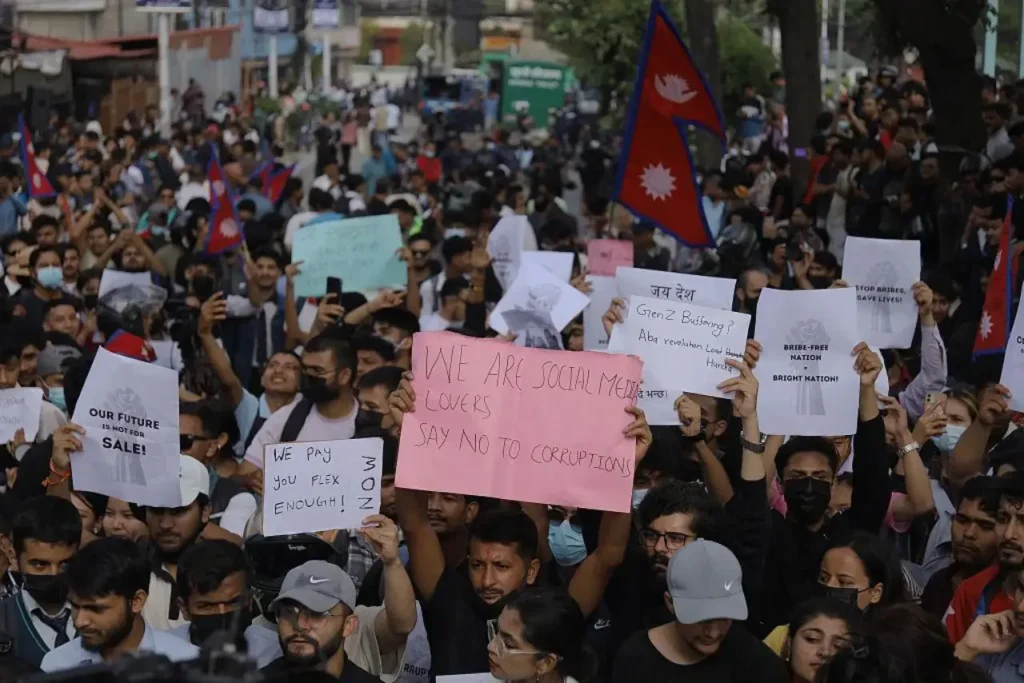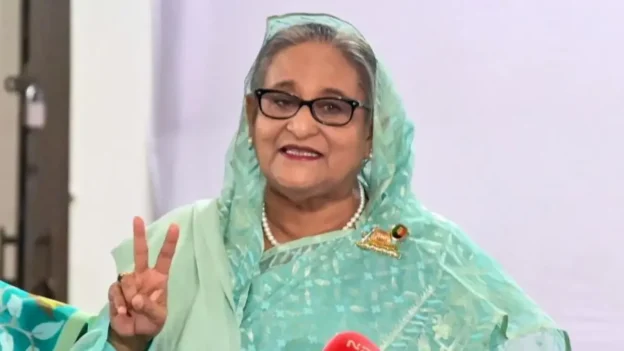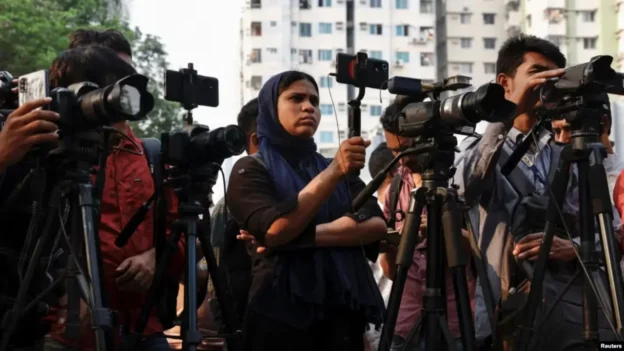This week Nepal has witnessed an unprecedented two-day political movement led by Nepalese Youth Gen Z on 8 and 9 September. The movement was called against the banning of social media and to eradicate corruption in Nepal. By receiving active and physical support from the youth, Gen Z utilised the digital society “social media” and succeeded in sharing the post of participation appeal within the youth community. This materialised. Tens of thousands of youths came onto the streets.
In two days, the movement killed 20 people, injured many, caused heavy damage, and targeted leaders, officials, and businesses, ultimately forcing political decisions. It challenged long-standing parties and leaders, appearing as an anti-corruption struggle but in reality reflecting deeper issues that pressured enlightened groups in Nepal and beyond.
The spontaneous participation of school children, teenagers, youths, and on the second day, people of all age groups in the movement has raised the question not only about the future of politics but also about how the participation of Gen Z in society as a whole will unfold. This movement has forced us to think about the Gen Z political rebellion, corruption cultivated under political patronage, abuse of political rights, and incompetent governance, the protest from the new generation against judicial structures and their lack of transparency. But during the course of this movement, the violent repression by the state, the death of dozens, the injury of hundreds, and the destruction of families and property caused by the youth movement have created a situation where this movement must be connected not only with a particular country but also analysed from regional and international perspectives.
The concept and birth of Gen Z
The Gen Z generation consists of citizens born between 1997–2012, who grew up in a digital environment, are technology-literate, and are closely connected with foreign employment, global political practices, and cultures. This generation belongs to those who grew up with new ideas and understandings. Unlike older generations who lived in patron-client relations and a generation that prefers society, nation, and politics to run based on these structures, legality, and transparent practices, they do not wish to remain stuck in any kind of difficulty. From a Marxist perspective, this generation is understood as having grown up within a mixture of the new petty bourgeoisie and progressive working class, emerging from the semi-feudal structure. They hold the capacity to challenge power and class relations that operate on patron-client based political practices. It can be said that this political character and capacity have been demonstrated by this generation in Nepal at present.
The disturbance created in Nepal’s power
Within two days, around 62 continuous hours, this movement shook the political leaders and the stability of the state that had been entrenched in power and politics since 1990 and even succeeded in toppling the government born out of the parliamentary system. In the process, former prime ministers, well-known and seemingly powerful ministers were attacked by crowds, and government buildings were set on fire, which was tragic.
The movement and its results within these two days were the impact of an appeal spread through social media. The direct participation of the general public in this movement shows that, compared to the political system, traditional organisational power, and structural practices that had been ongoing for decades, digital networks and youth consciousness are increasingly becoming powerful and shaping political influence. But it has raised concern: is this only an internal rebellion of Nepal, or is it also a kind of counter-hegemony? This indicates the possibility of displacing the old ruling classes and parties of Nepal.
In this world society connected by the digital society, is this political event confined only to Nepal, or does it suggest that in the future political practice and questions will also follow the same globalised, unified social and economic system? This is a subject of speculation and debate.
Possibility of regime change
From a political and theoretical perspective, it is not yet possible to fully understand Nepal’s Gen Z movement. The main concern is whether the Gen Z movement is just an ordinary political force or one that will remain influential in the future. Although the movement’s primary aim was ending corruption and establishing accountable governance, it has raised serious questions about the existing political system. Even from a Marxist analysis, this is not only opposition to individual leadership but perhaps also a challenge against the entire semi-feudal and semi-colonial structure, providing grounds for such analysis. Viewed this way, the movement carries the potential not only in Nepal’s context but also for regime change in other countries and regions.
Future impacts
Within two days, the Gen Z movement demonstrated social and political power without any organisation, created political upheaval, and made it certain that Gen Z will have an increasing influence in Nepal’s political practices in the near future. But the challenge lies in the absence of organisational structure and long-term ideological foundations.
On the other hand, this rebellion by Gen Z also signals how to coordinate between the political leadership and presence that existed before Gen Z. Even if political reconciliation between the two is achieved, how to bridge the gap in understanding will remain a central issue. If this generation cannot organise itself into political programmes and ideologies, the movement may remain momentary. In such a case, the political system will undoubtedly face crises, but identifying the potential foundations to solve such crises becomes equally important.
If organisation and ideology are connected, this could shake not only Nepal’s power structure but also the entire political culture of South Asia. Then, debates will also arise on how to adjust between old and established political theories and ideas.
Impact on regional politics
South Asian politics and power have long been based on traditional political practices dominated by the same old parties, family-centred leadership, and military/bureaucratic authority, alongside constitutional governance. But dissatisfaction among youth is growing everywhere in India, Pakistan, Bangladesh, and Sri Lanka.
The Gen Z movement that started in Nepal has raised the danger of becoming an “inspiration” for new political experiments across the region, forming a basis for similar Gen Z movements. This could connect not only to the Gen Z generation but also to farmers’ movements or the dissatisfaction of civil society in South Asian countries and beyond. It could evolve into the form of digital movements and create political crises regionally. One can connect this with the movement currently rising in Pakistan against the old military-dominated structure, as well as with the youth rebellion that emerged in Sri Lanka following the economic crisis.
Viewed this way, the rebellion born in Nepal is not just internal but a signal of a new phase in regional political consciousness.
International dimension
In Nepal, which is linked with the capitalist world system, it is natural for the Gen Z movement to become a subject of international attention. Depending on their interests and perspectives, different countries have begun to interpret this movement and its outcomes differently. While Western nations may interpret it as a struggle for democratic rights and freedoms, neighbouring power nations like China and India may interpret it differently, possibly viewing it as instability and a security risk.
But its impact may extend beyond Nepal to affect the geopolitical balance of the entire Himalayan region. An ideological dimension is also tied to this. It raises the question whether the expanded political system of “democracy,” which is supposed to create good governance, transparency, equality, and impartial governance, has actually been jolted, or whether it has opened space for refinement.
The lack of good governance, entrenched corruption, political patronage, nepotism (the “nepobaby” term coined by Gen Z), and judicial fluidity have raised the question of whether there are fundamental flaws in the system itself, making it appear as though the system has failed. This has also created the space for debate on what the alternatives could be.
The relationship between Gen X and Gen Z
The two-day Gen Z movement has raised another curiosity. Gen X (ages 30–50) are currently becoming important in political and economic positions. They are ahead in political investment economically, experience, and managerial abilities. This generation has received political and ideological training and understanding, and although slower in structural thinking, it is politically capable. But the reality remains that Gen Z’s political status has risen in Nepal because Gen X could not utilise their capacity effectively.
In the coming days, if the gap between these two generations is not bridged in time, mutual distrust may increase, leading to greater instability. Therefore, an environment of cooperation between these two generations must be created, linking the experience of Gen X with the innovation of Gen Z, in order to build a stable and progressive society through political, economic, and social development.
Intergenerational interaction and stability
To reduce such differences and potential conflicts and create stable and progressive conditions regionally, intergenerational interaction is essential to provide stability to the immediate rebellion of Gen Z. For this, common platforms of dialogue and cooperation must be created. Both generations should be involved in political training and ideological education (Marxist, democratic values).
A balance must be sought in elections, debates, and digital participation.
The need for regional cooperation
The dissatisfaction revealed by the Gen Z movement is not only Nepal’s problem but a shared experience of the entire South Asian region. Therefore, regional cooperation is essential. Through South Asian or other regional mechanisms, youth political participation can be increased. At the international level, cooperation on digital rights, transparency, education, and employment must be expanded. Without regional cooperation, youth rebellions could fragment and turn into violence and instability.
Further, the Gen Z movement born in Nepal is not only an anti-corruption rebellion; it is a historic challenge against the semi-feudal structure and old political hegemony. It has raised new questions not only for Nepal’s politics but also for the entire South Asian political landscape.
The time has begun when the younger generation will play a decisive role in power and ideas. But for long-term stability, organisation, ideology, intergenerational cooperation, and regional partnership will be indispensable.
Therefore, to ensure stability and peace, it is necessary to develop youth- and politics-oriented strategies by combining the political and social experience of Gen X with the energy, activism, skills, and knowledge of Gen Z. For this, cooperation with stakeholders in South Asian countries is also required, to create necessary plans and train youth through programmes, thereby building a secure regional political environment for the future. This is possible.

